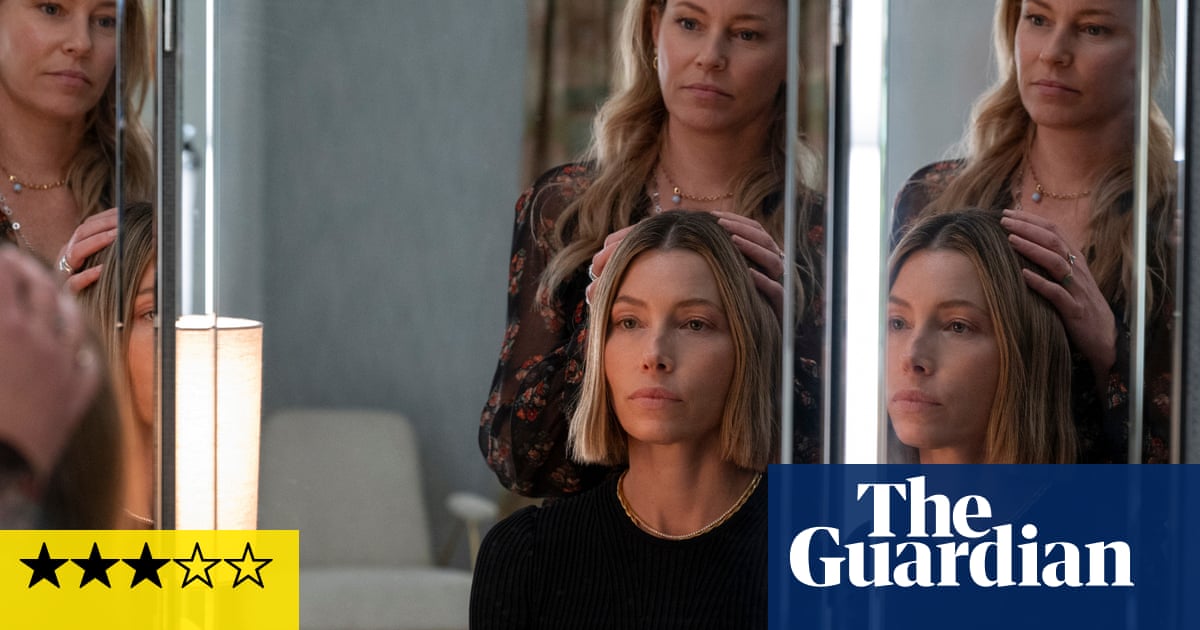It begins as thousands of stories have before – with a dead body and a host of unanswered questions. In The Better Sister, the deceased is lawyer Adam Macintosh (Corey Stoll), husband to high-flying women’s magazine editor Chloe Taylor (Jessica Biel) and father to amenable teen Ethan. As a couple, the Macintosh-Taylors are extremely well off and not particularly sympathetic: she radiates sleek perfection, absolute success and suitable levels of ruthlessness; he seems to be despised by all and sundry – including people unaware of the mind-boggling betrayal his current life is built on. So the question is not so much who murdered Adam and destroyed this family – but why on earth should we care?
The obvious reason is simply to sate our own morbid curiosity, which The Better Sister – an adaptation of the novel by Alafair Burke – expertly cultivates by presenting a dizzying array of potential perpetrators. The first is Chloe herself, who returns home from a dinner party to discover her husband lying on the floor, drenched in blood. But why does she pick up what looks like the murder weapon – her own penknife – and take it with her? Then there’s Ethan, who the investigating officers quickly isolate as their prime suspect due to a robust combo of false alibi, DNA evidence and the fact he staged a burglary at the murder scene. It’s not a great look.
But then there’s the shady company Adam has been working with (his boss, a close friend of Chloe’s, is the kind of villain who can be relied upon to make enigmatic phone calls milliseconds after his interlocutor exits the room). There are also the violent threats Chloe has received after defending workers’ rights during a congressional hearing. Or maybe the killer is an ancillary character who clearly detests Adam: Chloe’s multimillionaire publisher, Ethan’s drug-dealing friend, Adam’s colleague … take your pick!
Ormaybeit’s got something to do with Chloe’s sister, Nicky (Elizabeth Banks) – Adam’s first wife and Ethan’s long-estranged birth mother, who apparently neglected her son while in the throes of addiction. Chloe helped Adam gain custody of Ethan and the pair later got together, to Nicky’s horror. When the police discover Nicky is technically still Ethan’s legal guardian, they give her a ring. Before we know it, the swaggeringly brash and politically incorrect Nicky (she refers to a luxuriantly mustachioed police officer as “Borat”) has rocked up at Chloe’s massive, swanky NYC apartment and slid back into motherhood mode.
Relations between the pair are initially cordial, but soon they resemble two bickering, sarky teenagers; at one point Chloe informs her sister she has a “camel toe that can be seen from outer space”. This dynamic – combined with the relentless banter between the two lead detectives – suggests The Better Sister wants to be an overtly amusing yet still seriously harrowing murder mystery in the vein of Mare of Easttown. But while there are some witty lines (such as when Chloe drily bemoans the awkwardness of her acquaintances: “If only there was a murdered husband sad face emoji”), the irreverence is too inconsistent and the show too glossy and generally bland to charm on comedic grounds.
Still, this is a highly functional whodunnit, thanks to a shoal of red herrings and a twist that is initially unguessable. But The Better Sister’s appeal doesn’t rely solely on the promise of revealing who killed Adam (he seems like a piece of work anyway). Instead, this is a real schadenfreude-watch. The streaming age specialises in thrillers that chronicle the terrible misfortune of attractive, affluent women (see: practically every show Nicole Kidman has starred in over the past decade). This is partly an excuse to fill the screen with beautiful views, luxe interiors and gorgeous clothes – elite home comforts that somehow comfort the viewer too. It’s also an excuse to see supposedly perfect lives implode; not just as a result of contemporary crimes, but by revealing that these characters’ psyches have been hellish messes all along. The Better Sister is not exactly subtle on this front: as one police officer baldly sums it up: “No one likes watching a wealthy woman fall more than I do.”
On the one hand, it’s a relatively hollow form of entertainment; less eat the rich, more watch the powerful grapple with their demons and be grateful your own problems aren’t quite so bafflingly labyrinthine. On the other, this is the bedrock of much tragedy, Greek onwards. Whether you want catharsis and consolation in the form of Biel and Banks trading poor taste zingers between flashbacks to their communal childhood trauma is a matter of personal taste. But when it comes to reassuring downfalls, this decent-enough drama knows how to play the game.
The Better Sister is on Prime Video.
